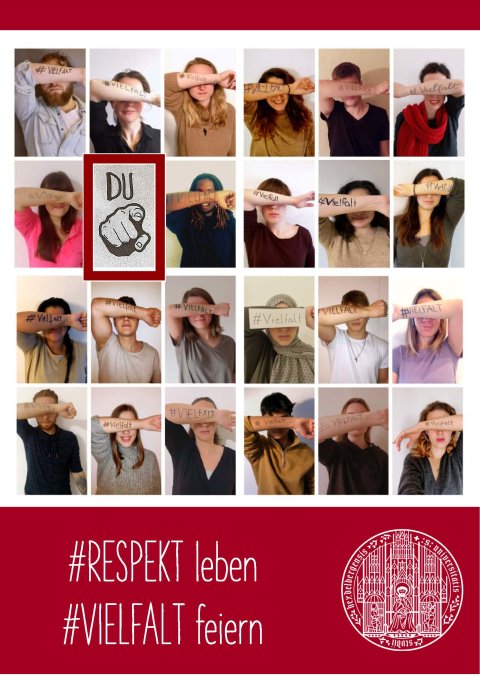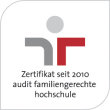Topic Page Anti-racism
In its mission statement, the University has committed itself to the diversity of its members. This commitment to diversity also involves the identification of discriminatory structures, language and actions, building anti-racist knowledge and creating an empowering environment for those affected.
This page provides information on the topic of racial discrimination and educational offers/networking on anti-racism.

Competition entry by student Sarah Fölsch as part of the campus campaign: "Heidelberg University - Living Respect, Promoting Diversity, Shaping Together".
[Image description: The image shows many small portraits of different students of the university. All of them raise their right arm in front of their face so that their eyes are covered. On the forearm, each picture says #diversity. In one of the picture tiles a hand is shown, the index finger points to the viewer. Above it is written YOU. In a red bar below the photos, to the left of the university logo, it says #LIVING RESPECT and celebrating #DIVERSITY.]
Overview:
Glossary – What are we talking about?
Events and offers – What is happening at the University?
Book and audio recommendations – Where can I learn more?
Empowerment and networking – Where can I connect with others?
Contacts in case of racial discrimination – Whom can I turn to?
Glossary
Everyday Racism
This term describes the fact that racist ideas, racist language and images are reproduced daily in individual, structural and collective acts in the media, at school, at work and in the public. Everyday racism oftentimes happens unconsciously and unintentionally, for example, in form of praise for speaking “surprisingly good German” or in form of intrusive behaviour such as touching someone’s hair without asking. For those affected, everyday racism oftentimes is a recurring traumatic experience – they are repeatedly confronted with “othering.”
Critical Whiteness
Critical Whiteness studies is a scientific and political approach that looks at whiteness as a social category and thereby wants to question its norm-defining position. As an approach, it originated in the US, but it is not an academic “invention.” For decades, Black activists and civil rights activists have been addressing the privileges and structures of inequality that white people have established and benefit from – in Germany, this critical attention only entered public and academic discourse about ten years ago.
Microaggression
Microaggression is a term used to denote forms of everyday racism that, at first glance, may have even been intended as a compliment on the part of the person committing it (“but you speak German so well”) or may seem like expressions of curiosity/interest (“where are you from originally?”). However, what is really signalled here is that the person being addressed in such a manner does not “fit” the norm or cannot be part of “normal” society because of their appearance or their purported cultural background. If it were to happen only once, such questioning of someone’s identity might perhaps be something that could be handled, but it is in their regular occurrence that microaggressions show their destructive potential, as those affected oftentimes experience them as repetitively hurtful acts of exclusion. Upon being confronted with their microaggressions, white people oftentimes react with “white fragility.”
Othering
The term “othering” was introduced by postcolonial theorist Gayatri Chakravorty Spivak in 1985.1 In a society, it describes the process of an intentional or inadvertent demarcation by means of constructions such as “we” and “the others.” In comparison to “we” as the social majority, “the others” are thereby either degraded as being “less enlightened,” “less educated,” “less able” or characterised with supposedly positive features such as “exotic,” “nature-loving,” “racy,” “a natural sportsperson/dancer.” Those affected experience such attributions and being reduced to stereotypical, racist features in form of everyday racism, e.g. microaggressions, as continuous acts of exclusion that are detrimental to any sense of belonging and greatly impede processes of identity formation.
PoC /BIPoC
These acronyms stand for People of Color and Black, Indigenous People of Color. As self-designations, they represent different communities that experience racism and exclusion based on aspects of physical appearance or cultural attribution by others. In Germany, this includes people of the African, Asian or Latin American diaspora.
Racism
Racism is an ideology that degrades people based on aspects of physical appearance, their names, their ascribed background, culture or religion. Racism comes in many forms, from everyday racism and structural racism to racist acts of violence. For something to be racist, it does not need a declaration of intent: Acts and remarks can be racist even if committed unwittingly or unintentionally. In fact, racism always exists within a framework of unequal power relations, in which one group of people is taken to be “the norm” and has at its disposal more resources of participation and power than others, who, in turn, are subjected to mechanisms of exclusion.
Classical biological racism can be traced to modern colonialism. Based on “research” in the natural sciences on phenotypical features such as skin colour, the existence of “human races” was construed, which were hierarchized according to ascribed features and abilities or lack thereof. White Europeans were positioned at the top of this hierarchy. The hierarchical racialising and degradation of non-white people served to legitimise the exploitation and enslavement of “inferior races.” Cast as “uncivilised,” “stupid” and “instinct-driven,” these “inferior races” were to be “dominated,” “civilised” and – in some cases – “saved” by European colonial powers.
In 1989, British sociologist Stuart Hall coined the term “cultural racism,” a racism without races, that took the place of biological racism.2 Instead of assigning deficits to alleged human “races,” one now spoke of immutable cultural deficits. From a Eurocentric perspective, members of a purported culture were thus attributed a set of (oftentimes negative or deficient) characteristics and stereotypes, which first and foremost highlighted their “otherness” in order to demonstrate the irreconcilability with Western norms and legitimise the hegemonic aspirations of Western culture.
Black People, Blackness
Black does not denote skin colour. Black or Black people (with a capital B) is a self-designation of the community and describes unequally construed power relations and structural inequalities that are to be made visible in the term Blackness. The adjective “coloured” is rooted in colonial discourse and should not be used at all. “Dark-skinned” is a description that many Black people and PoC reject as well.
Structural Racism
Structural or institutional racism denotes that over centuries racial knowledge has been and continues to be handed down and reproduced (unconsciously) in our societal structures, the job and housing market, institutions of education, public offices and jurisprudence. Black people and PoC are thus confronted with barriers to participation, experience discrimination or racist violence at school, at their place of study or in job training, in the job or housing market, or by public authorities. Acknowledging that our societal structures are informed by racism and that we as individuals are therefore also socialised in a racist manner, is a first step towards critically reflecting on racism.
White People, Whiteness
White, in its italicised and lower-case form, too, does not denote skin colour. It makes visible the privileged positions of people that are read as white in a society that is shaped by structural inequalities and racism. White people dominate in a white (economic) world order and benefit from it. They can reproduce racism – consciously or unconsciously – without ever being affected by racism themselves.
White Fragility
The term “white fragility” was coined by American sociologist Robin DiAngelo in 2011.3 In Critical Whiteness studies, the term describes a typical reaction of white people when their everyday racism in form of microaggressions, for instance, is pointed out to them. It takes the form of strong emotional outrage, repudiation, aggressive denial or downplaying the experiences with racism of those affected.
White Privilege
White privilege denotes the entirety of advantages, privileged positions and freedom of choices that white people as members of the “norm” in a social majority enjoy without even being aware of it. Not having to think about skin colour and racism and not reflecting on one’s own whiteness is part of “white privilege,” too. Whereas “the others” are “Black,” “Turkish,” “Muslim,” one sees oneself simply as a “human being” or “German person.”
More information about non-discriminatory language can be found here:
Glossar der Neuen Deutschen Medienmacher*innen
As a comprehensive work of reference, we can recommend:
Susan Arndt and Nadja Ofuatey-Alazard (eds.):“Wie Rassismus aus Wörtern spricht - (K)erben des Kolonialismus im Wissensarchiv deutsche Sprache. Ein kritisches Nachschlagwerk,” Unrast-Verlag (2011).
1 Spivak, Gayatri Chakravorty (1985): The Rani of Simur. An Essay in Reading the Archives. In: Barker, Francis et al. (eds.): Europe and its Others. Colchester: University of Essex, 128–151.
2 Hall, Stuart (1989b): Rassismus als ideologischer Diskurs. In: Das Argument 178, Hamburg: Argument Verlag. S. 913-921.
3 DiAngelo, Robin (2011): White Fragility. In: International Journal of Critical Pedagogy, 3(3).
Parts of this glossary are modelled on the annotations in the Glossar des Informations- und Dokumentationszentrums für Antirassismusarbeit e. V. (last accessed 17 March 2021).
Events and offers – What is happening at the University?
Summer term 2021:
"Unlearning" Racism at University
A series of workshops with Kamady Fofana
Awareness Workshop
Target audience: white students
19 July 2021; 9.00-13.00 via zoom.
----------------------------------------------------------------------------------------------------------
Empowerment Workshop
Target audience: Black, Indigenous People of Colour (BIPoC)
20 July 2021; 9.00-13.00 via zoom.
----------------------------------------------------------------------------------------------------------
Racism-critical approaches for university teaching
Target audience: Teaching staff and members of university
23 July 2021; 9.00-13.00 via zoom.
---------------------------------------------------------------------------------------------------------
![]() more information on workshops and instructors
more information on workshops and instructors
Places are limited. Please register with: evelyn.kuttikattu@uni-heidelberg.de
After successful registration you will receive the link for participation.
Book and audio recommendations
Books (German and English):
- “Mist, die versteht mich ja - Aus dem Leben einer Schwarzen Deutschen,” the biography of Florence Brokowski-Shekete, the guest in episode one of our podcast.
- “Deutschland und die Migration: Geschichte einer Einwanderungsgesellschaft wider Willen,” publication by Dr Maria Alexopoulou, the guest in episode two of our podcast.
More recommendations:
- “Exit Racism” by Tupoka Ogette
- “Was weiße Menschen nicht über Rassismus hören wollen, aber wissen sollten” by Alice Hasters
- “Deutschland Schwarz Weiß” by Noah Sow
- “Why I'm No Longer Talking to White People About Race” by Reni Eddo-Lodge
- “Schwarzer Feminismus” edited by Natasha A. Kelly
- “Where We Stand: Class Matters” by belle hooks
- “Between the World and Me” by Ta-Nehisi Coates
- “The Hate U Give” by Angie Thomas
- “Eure Heimat ist unser Albtraum” by Fatma Aydemir, Hengameh Yaghoobifarah et al.
- “So You Want to Talk About Race?” by Ijeoma Oluo
- “Women, Race & Class” by Angela Davis
- “White Fragility: Why It’s So Hard for White People to Talk About Racism” by Robin DiAngelo
Podcasts and audio interviews:
- Deutschlandradio Denkfabrik Dekolonialisiert Euch! “Sprache dekolonialisieren” with Susan Arndt
- Tupodcast by Tupoka Ogette
- Feuer&Brot with Alice Hasters and Maxi Häcke
- Die kleine schwarze Chaospraxis, “akademia” episode with Ninja LaGrande and Denise M`Baye
- Intersectionality Matters! with Kimberlé Crenshaw
- Kanackische Welle by Marcel Aburakia and Malcolm Ohanwe
- Identitäten, Deutschlandfunk series
- Halbe Katoffl by Frank Joung
Empowerment and networking, locally and across Germany
Vashu e.V. – Association of African students at Heidelberg University
Facebook group: @VasuhOfficial
email
UMOJA! e.V. Mannheim
An intergenerational team of Black and African people and people of the African diaspora.
Empowering workshops und safe spaces for Black people.
Facebook group: Umoja-ma
Migration Hub Heidelberg
Network in the Rhine-Neckar region. Providing rooms, networking and individual aid and support of initiatives by and for migrants and BPoC.
website
ADAN e.V. Afro German Academics Network
A network for students, professionals and companies/organisations. Mentoring, events, professional contacts and personal exchange. The members work towards imparting a nuanced image of Africa.
website
ISD – Black People in Germany Initiative
An association of Black people standing up for the interests of Black people in Germany. The association would like to promote Black awareness, to fight racism and to support networking between Black people and their organisations.
website
ADEFRA e. V.
A cultural-political forum by and for Black women* aimed at promoting the quality of life of Black women* and girls in Germany.
website
MyUrbanology
An online platform for Black people and PoC perspectives in German-speaking regions. Role models, lifestyle topics, research, happy places, literature, job offers.
website
Contacts in case of discrimination
Contact persons in accordance with the General Act of Equal Treatment in cases of racial discrimination at the University:
- Prof Dr Peter Kirsch
Central Institute of Mental Health, Mannheim
email: peter.kirsch@zi-mannheim.de
- Prof Dr Christiane Schwieren
Alfred-Weber-Institute for Economics
email: christiane.schwieren@awi.uni-heidelberg.de
Independent unit for persons affected by racism and discrimination based on cultural attributions:
email: rbd@stura.uni-heidelberg.de
website with incident report form
Local Anti-Discrimination Agency:
Office of Equal Opportunities
Bürgeramt Mitte
Bergheimer Straße 69
69115 Heidelberg
antidiskriminierung@heidelberg.de
Phone: 06221 58-15500






